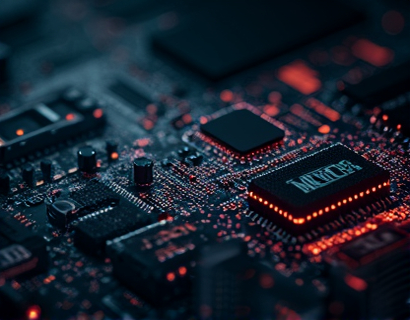Smart Contract Automation for Seamless Dividend and Earnings Distribution
In the rapidly evolving landscape of FinTech, the integration of smart contract technology has emerged as a transformative force, particularly in the realm of financial management. This article delves into how smart contract automation can revolutionize the distribution of dividends, earnings, and scheduled payments, offering businesses a more secure, transparent, and efficient way to manage their financial obligations. By leveraging the inherent properties of blockchain and smart contracts, companies can streamline their operations, reduce manual errors, and enhance overall control over their financial processes.
Understanding Smart Contracts
Smart contracts are self-executing contracts with the terms of the agreement directly written into code. They run on a blockchain network, which ensures that all transactions are recorded transparently and immutably. Unlike traditional contracts, smart contracts automatically enforce and execute the terms of the agreement when predefined conditions are met. This automation eliminates the need for intermediaries, reducing costs and increasing the speed of transactions.
Benefits of Smart Contract Automation in Financial Management
The adoption of smart contract automation in financial management brings numerous advantages. Firstly, it ensures security by utilizing cryptographic techniques to protect data and prevent unauthorized access. Transactions are verified by multiple nodes in the network, making it extremely difficult for any single entity to manipulate the system. Secondly, transparency is a core feature of blockchain technology, allowing all parties to view the transaction history and current state of the contract. This level of transparency builds trust among stakeholders and reduces the risk of fraud.
Additionally, smart contract automation significantly enhances operational efficiency. Manual processes, such as verifying and distributing dividends or earnings, are time-consuming and prone to human error. Smart contracts automate these tasks, ensuring that payments are made precisely when conditions are met, without the need for manual intervention. This not only saves time but also reduces the likelihood of errors, leading to more reliable and consistent financial management.
Automating Dividend Distribution
Dividend distribution is a critical aspect of corporate finance, yet it is often a cumbersome process involving multiple steps and stakeholders. With smart contract automation, the process becomes streamlined and efficient. Here’s how it works:
First, the smart contract is programmed with the specific conditions for dividend distribution, such as the amount, frequency, and eligibility criteria. Once these conditions are defined, the contract waits for the trigger event, such as the end of a fiscal period or the achievement of certain performance metrics. When the trigger event occurs, the smart contract automatically calculates the dividend amounts based on the predefined rules and distributes them to the eligible shareholders.
The use of smart contracts in dividend distribution ensures that payments are made accurately and promptly. Shareholders receive their dividends without delay, and the company avoids the administrative burden of manual calculations and payments. This automation also provides a clear and auditable record of all transactions, enhancing accountability and compliance with regulatory requirements.
Earnings Distribution and Bonus Payments
Earnings distribution, including bonus payments to employees, is another area where smart contract automation can bring significant benefits. Traditional methods of distributing earnings often involve complex calculations, manual approvals, and delayed payments. Smart contracts can simplify this process by automating the entire workflow.
The smart contract can be programmed to distribute earnings based on specific criteria, such as performance targets or milestones achieved. Once the conditions are met, the contract automatically initiates the payment process. This ensures that bonuses and earnings are distributed fairly and transparently, reducing the potential for disputes and increasing employee satisfaction.
Moreover, smart contracts can be designed to handle varying types of earnings distributions, such as cash bonuses, stock options, or other forms of compensation. The flexibility of smart contracts allows companies to tailor the distribution process to their specific needs, ensuring that all employees receive their rewards in a timely and accurate manner.
Scheduled Payments and Recurring Transactions
Scheduled payments, such as rent, salaries, and utility bills, are routine financial obligations that require regular attention. Smart contract automation can greatly simplify the management of these recurring transactions. By setting up a smart contract with the payment details and schedule, businesses can automate the payment process, ensuring that all obligations are met on time.
The smart contract can be programmed to trigger payments at specific intervals, such as monthly, quarterly, or annually. When the scheduled date arrives, the contract automatically verifies the necessary conditions, such as the availability of funds and the validity of the recipient's details, and initiates the payment. This automation eliminates the risk of missed payments and reduces the administrative workload, allowing businesses to focus on more strategic activities.
Additionally, smart contracts can provide real-time updates and notifications for both the payer and the payee. Payers can track the status of their scheduled payments, while payees receive confirmations of receipt, enhancing transparency and trust in the transaction process.
Enhancing Financial Control and Compliance
The use of smart contract automation in financial management not only streamlines processes but also enhances control and compliance. By embedding the rules and conditions directly into the contract, companies can ensure that all financial transactions adhere to predefined standards and regulations. This reduces the risk of non-compliance and provides a clear audit trail for regulatory scrutiny.
Smart contracts can be designed to incorporate compliance checks, such as verifying that certain financial thresholds are met before allowing a payment to proceed. This proactive approach to compliance helps businesses stay ahead of regulatory requirements and avoids potential penalties.
Furthermore, the immutable nature of blockchain ensures that all transaction records are tamper-proof. This level of security is invaluable for businesses that need to maintain accurate and reliable financial records, especially in industries with strict regulatory oversight.
Challenges and Considerations
While the benefits of smart contract automation are clear, there are several challenges and considerations that businesses should be aware of when implementing this technology. One of the primary challenges is the technical complexity involved in developing and deploying smart contracts. Businesses may need to invest in training or hire specialized talent to ensure the successful implementation of smart contract solutions.
Another consideration is the interoperability of smart contracts with existing financial systems. Integrating smart contracts with legacy systems can be challenging, requiring careful planning and coordination. However, as the FinTech industry continues to evolve, more tools and platforms are emerging to facilitate seamless integration.
Privacy concerns also play a role in the adoption of smart contract technology. While blockchain provides transparency, it can also expose sensitive financial data. Businesses must implement robust privacy measures, such as using permissioned blockchains or encrypting sensitive information, to protect their data while still benefiting from the transparency of smart contracts.
Case Studies and Real-World Applications
Several companies have already begun to leverage smart contract automation for dividend and earnings distribution, with positive results. For instance, a major financial institution implemented a smart contract-based system for distributing quarterly dividends to its shareholders. The system automatically verified the eligibility of shareholders, calculated the dividend amounts, and initiated payments on the specified date. The result was a significant reduction in processing time and a higher level of accuracy in the distribution process.
In the corporate sector, a leading technology firm used smart contracts to automate the distribution of employee bonuses based on performance metrics. The smart contract ensured that bonuses were paid out promptly and accurately, based on the predefined criteria. This not only improved employee satisfaction but also reduced the administrative burden on the HR department.
These case studies demonstrate the practical benefits of smart contract automation in financial management, highlighting its potential to transform traditional processes and enhance business operations.
Future Trends and Innovations
The future of smart contract automation in financial management looks promising, with ongoing advancements in blockchain technology and FinTech innovations. One area of focus is the development of more user-friendly platforms that simplify the creation and management of smart contracts for non-technical users. This will make smart contract automation accessible to a broader range of businesses, regardless of their technical expertise.
Another trend is the integration of smart contracts with other emerging technologies, such as artificial intelligence and the Internet of Things (IoT). AI can enhance the decision-making capabilities of smart contracts, allowing for more dynamic and adaptive financial management. IoT devices can provide real-time data inputs, enabling smart contracts to respond to changing conditions in real time.
Additionally, the rise of decentralized finance (DeFi) platforms is opening new possibilities for smart contract automation in financial management. DeFi offers a suite of financial services, including lending, borrowing, and trading, all built on blockchain networks. Smart contracts play a central role in DeFi, enabling automated and trustless financial transactions.
Conclusion
Smart contract automation represents a significant leap forward in financial management, offering businesses a secure, transparent, and efficient way to handle dividend and earnings distribution, as well as scheduled payments. By leveraging the power of blockchain and smart contracts, companies can streamline their financial processes, reduce manual errors, and enhance overall control. While there are challenges to consider, the potential benefits make smart contract automation a compelling solution for businesses seeking to elevate their financial management practices.











































